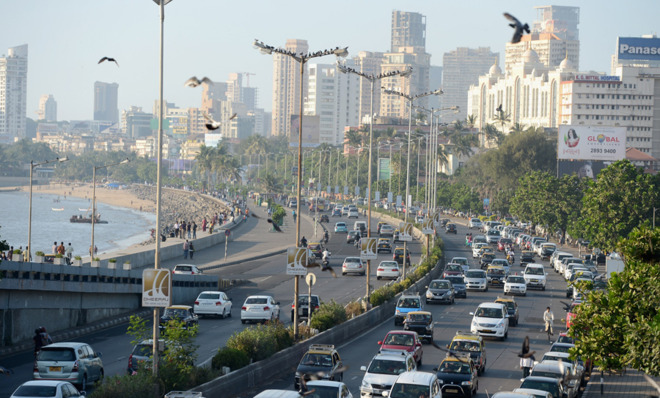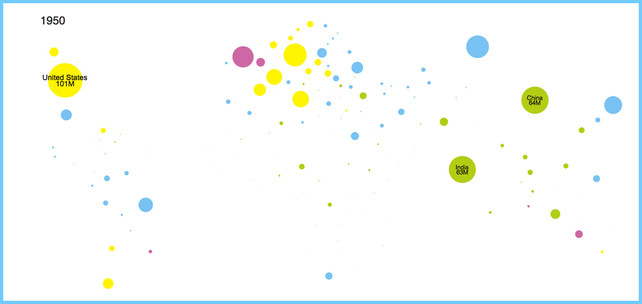The world's mass migration to cities may slow down — or reverse
A new report predicts that 70 percent of people will live in cities by 2050. Not so fast.

A free daily email with the biggest news stories of the day – and the best features from TheWeek.com
You are now subscribed
Your newsletter sign-up was successful
The world crossed an important milestone in 2008: For the first time in history, more than half of Earth's population lived in cities. And now, if current population trends continue, more than 70 percent of the world's population will be urban by 2050.
These visuals produced by UNICEF show just how much the world's urban population has exploded between 1950 and 2000, and the growth we may well see in the next 50 years:

[Unicef]
The Week
Escape your echo chamber. Get the facts behind the news, plus analysis from multiple perspectives.

Sign up for The Week's Free Newsletters
From our morning news briefing to a weekly Good News Newsletter, get the best of The Week delivered directly to your inbox.
From our morning news briefing to a weekly Good News Newsletter, get the best of The Week delivered directly to your inbox.
Now, before we start assuming that that last bubble graph is an inescapable reality, remember this: Economic trends do not continue indefinitely. There are positives and negatives of living in cities. And there's no guarantee that the positive economic trends will always trump the negative ones.
The advantages of living in cities — especially for people in developing countries, where the countryside does not have much infrastructure, and jobs are mostly in subsistence agriculture — are many and varied. Cities are big, complex concentrations of people and economic activity, and big concentrations of people have lots of different needs and wants, meaning lot of different employment and business opportunities in various fields, including retail, offices, and factories. And bringing large groups of different people together gives people the opportunity to share ideas and information, which encourages creativity, innovation, and new industries.
This also produces a wide variety of different shops and businesses, and the availability of many various kinds of goods and services. Factories build up around each other, turning into supply chains. Schools and universities expand to train a growing number of students for a growing number of professions. Businesses try to locate themselves near customers and skilled labor. A growing number of people with spare time and money give rise to entertainment, recreation, and culture — theaters, museums, concert halls, art galleries,and restaurants. And this generally translates into better infrastructure — better quality roads, postal delivery, public transport systems, parks, waste disposal, water treatment, broadband internet, electricity. This process is called agglomeration.
Now, obviously these opportunities aren't universal in cities in poorer countries. Agglomeration can be slow. In places like India and Brazil, villagers who move to the city often end up living in ad hoc slums without water, internet, or electricity. But urban employment and business opportunities are still sufficient to encourage millions per year to move from the undeveloped and economically stagnant countryside into cities, even if this means living in slums (at least to begin with).
A free daily email with the biggest news stories of the day – and the best features from TheWeek.com
Of course, there are also negatives to living in cities. Crime, pollution, noise, contagious disease, lack of access to outdoor space, higher cost of living, and high and rising real estate prices. As an extreme example, it is possible to buy a castle in the European countryside for less than some apartments in New York and London. This means that three- or four-bedroom houses with gardens in rural areas and suburbia can be many times cheaper than an apartment in the city, let alone a comparably sized house.
For most of the last century, the negatives seem to have been greatly outweighed by the economic opportunities and other advantages of living in cities, which is why such huge numbers of people have made the decision to migrate to cities. But what if this trend doesn't hold into the future?
As countries develop and become richer, infrastructure — electricity, water, street lighting, broadband, postal deliveries, higher-quality roads — tends to spread out from the major cities to the rest of the country. And with the advent of the internet — and its spread into rural areas — it has become easier and easier to live a connected life without physically being in a city. Anyone with an internet connection can become part of the agglomeration. People living in rural areas can order the same variety of goods and services over the internet (for next day delivery) as people in cities. They can share ideas — or culture — with millions of people via social networks like Twitter and Facebook. People can do business with customers and recruit remote employees all over the world, from any city or rural area, so long as they have a connection to the internet. And as technologies like decentralized solar and wind energy and home manufacturing via 3D printing grow, the possibilities for increasing economic decentralization grow.
In other words, in Western countries it is beginning to become possible for more people to leave the high real estate prices, crime, pollution, and noise of the city behind and migrate to a rural area, yet still live a connected life — and enjoy many of the benefits of a connected life — via the internet.
As development accelerates in other countries — and as more and more industries move their business online — that trend will begin to spread worldwide.
That means it is very possible that the trend toward city living may slow, or even reverse.
John Aziz is the economics and business correspondent at TheWeek.com. He is also an associate editor at Pieria.co.uk. Previously his work has appeared on Business Insider, Zero Hedge, and Noahpinion.